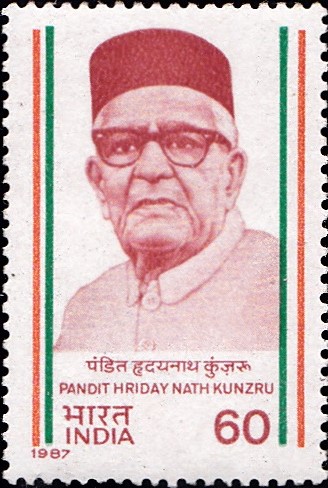
Pandit Hriday Nath Kunzru
A commemorative postage stamp on H. N. Kunzru, a Kashmiri Pandit parliamentarian, co-founder of Indian Council of World Affairs and Indian School of International Studies :

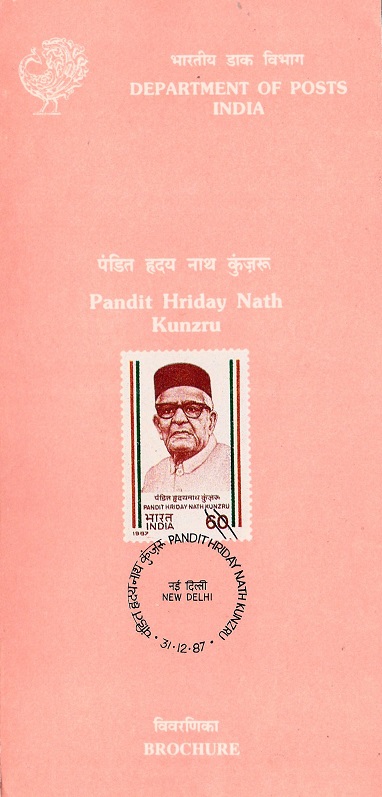 Issued by India
Issued by India
Issued on Dec 31, 1987
Description of Design : The stamp has been designed by India Security Press, Nashik Road. The design of the first day cover has been prepared by Shri Sankha Samanta and of the cancellation by Smt. Alka Sharma.
Type : Stamp, Mint Condition
Colour : Single colour
Denomination : 60 Paise
Overall size : 3.91 X 2.90 cms.
Printing size : 3.55 X 2.54 cms.
Perforation : 13 x 13
Paper : Indigenous unwatermarked adhesive P G Matt coated paper
Number Printed : 10,00,000
Number per issue sheet : 35
Printing Process : Photogravure
Printed : India Security Press
Name : Hriday Nath Kunzru
Born on Oct 1, 1887 at Agra, Uttar Pradesh, India
Died on Apr 3, 1978 at Agra, Uttar Pradesh, India
About :
- Pandit Hriday Nath Kunzru was born on 1st October, 1887 at Agra, the son of Pandit Ajudhia Nath, a top-ranking lawyer of his time and a leading figure of the early days of the Indian National Congress.
- He was educated at the University of Agra and Allahabad and at the London School of Economics.
- Under the inspiration of Gokhale, he joined the Servants of India Society. As its President for 42 years he contributed to public life, fighting against the caste system, untouchability and other social evil, supporting divorce and the succession rights of Hindu women. Interested in education, he was associated with the Universities of Allahabad and Delhi, the Banaras Hindu University, the Kashi Vidyapeeth and the Aligarh Muslim University. He established the Indian Council of World Affairs at Sapru House, New Delhi, which ran the School of International Studies, later taken over by the Jawaharlal Nehru University.
- In pre-independence politics, he was a Liberal, seeking to achieve self-government within the Commonwealth by constitutional means rather than by violent or non-violent mass agitation. He broke away from the Congress in 1920 along with other moderates to form the National Liberal Federation.
- As a member of the State and Central Legislative, he proved himself a distinguished parliamentarian. He was concerned about the Indianisation of the Civil Services and the armed forces, the treatment of Indian settlers abroad and industrialisation in the pre-independence days.
- In the post-independence period he took great interest in foreign affairs seeking genuine non-alignment. He believed in India‘s integrity based on the willing cooperation of the units. As a member of the States Reorganisation Commission he made valuable suggestions in safeguarding the interests of linguistic minorities. Critical of what he believed was an appeasement policy towards China, he advocated the building of military strength, so that India could play its proper role in world affairs.
- He did commendable work as General Secretary, Sewa Samiti, Allahabad, President of the U.P. Harijan Sewak Sangh and Chairman of the Railway Enquiry Committee. He never aspired for recognition or to any ministerial office, even declining to accept the title of Bharat Ratna. He passed away on 3rd April, 1978.


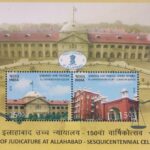
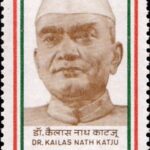
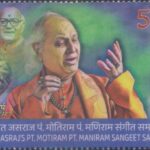
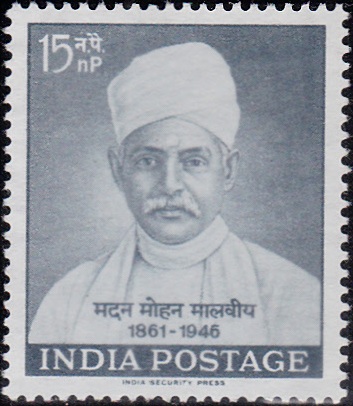
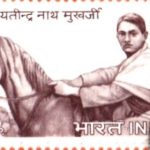
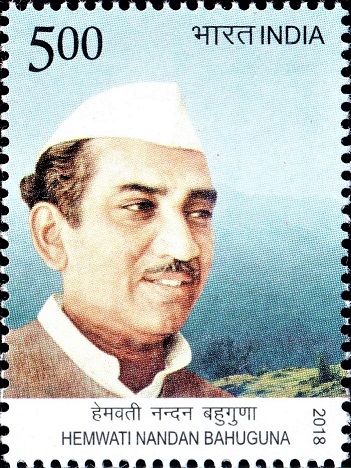
[…] first governing body of Children’s Film Society consisted of 13 members, headed by Shri H.N. Kunzru, who was designated as President of the Society. This society is an autonomous body, under the […]